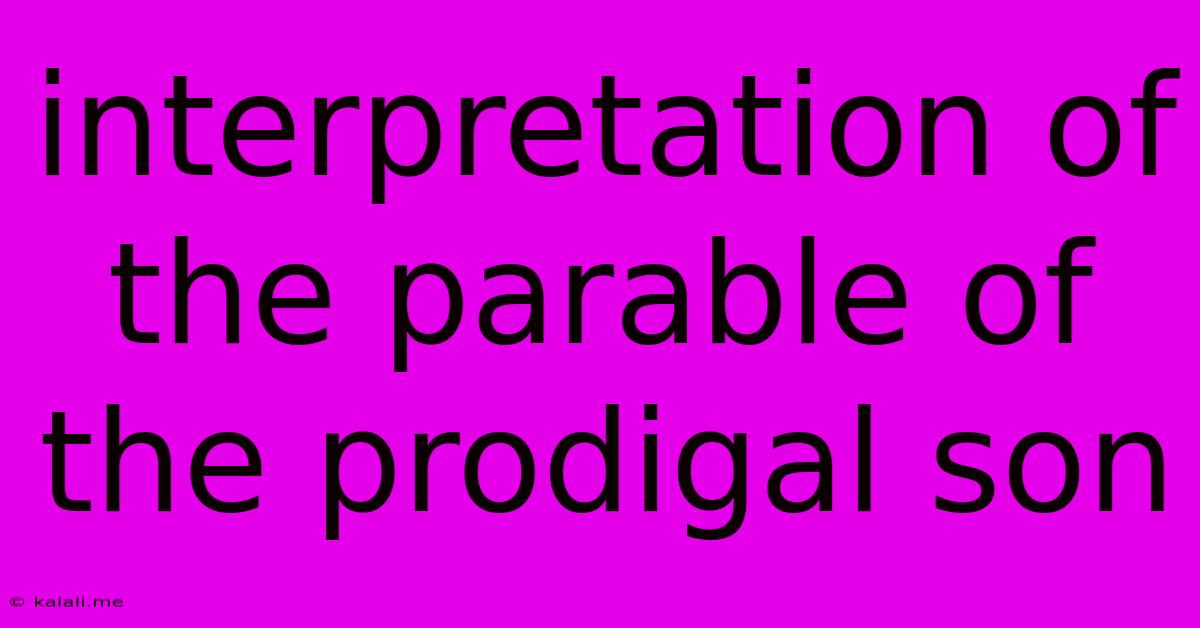Interpretation Of The Parable Of The Prodigal Son
Kalali
Jun 03, 2025 · 3 min read

Table of Contents
The Prodigal Son: More Than Just a Story of Forgiveness
The Parable of the Prodigal Son (Luke 15:11-32) is one of the most beloved and widely interpreted stories in the Bible. It's a powerful narrative about forgiveness, grace, and the unconditional love of a father. But its depth goes far beyond a simple tale of a wayward son returning home; it offers profound insights into God's relationship with humanity and the nature of repentance. This article will delve into the various interpretations and layers of meaning within this timeless parable.
A Deeper Look at the Characters and their Actions:
The parable features three key characters: the father, the prodigal son, and the elder son. Each plays a crucial role in revealing the message.
The Prodigal Son: A Symbol of Lost Humanity
The younger son represents humanity alienated from God. His demand for his inheritance symbolizes humanity's desire for independence from God's will, a pursuit of self-gratification and worldly pleasures. His subsequent squandering of his inheritance illustrates the futility of living a life detached from God's purpose. His eventual repentance is a powerful picture of acknowledging our need for God's grace and forgiveness. Key themes here include recklessness, repentance, and redemption.
The Father: The Embodiment of God's Unconditional Love
The father's character is arguably the most significant aspect of the parable. His unwavering love and compassion towards his son, despite his son's actions, is a striking portrayal of God's unconditional love for humanity. His eagerness to forgive and celebrate his son's return highlights God's grace and mercy. The father's actions demonstrate unconditional love, forgiveness, and celebration of redemption.
The Elder Son: A Reflection of Self-Righteousness
The elder son represents those who believe themselves righteous and deserving of God's favor. His resentment towards his brother's forgiveness highlights the danger of self-righteousness and the difficulty of accepting God's grace without judgment. He embodies the struggle with envy, pride, and understanding God's mercy. His story reminds us that even those who appear outwardly faithful can struggle with bitterness and a lack of compassion.
Interpretations and Key Themes:
-
God's Unconditional Love and Forgiveness: This is the most prominent theme. The father's welcoming embrace of his prodigal son highlights God's boundless love and willingness to forgive even the most grievous sins. This reinforces the message of grace and redemption available to all who repent.
-
The Importance of Repentance: The prodigal son's return demonstrates the importance of genuine repentance. His acknowledgement of his wrongdoings and his humble request for forgiveness are essential elements of his redemption. This underscores the need for humility and self-awareness in seeking God's forgiveness.
-
The Danger of Self-Righteousness: The elder brother's reaction serves as a cautionary tale against self-righteousness and judgmentalism. It emphasizes the need for compassion and understanding towards others, even those who have strayed from God's path.
-
The Celebration of Redemption: The father's celebration of his son's return signifies the joy God experiences when a sinner repents and returns to Him. This highlights the significance of celebrating the restoration of broken relationships and the triumph of grace over sin.
Conclusion:
The Parable of the Prodigal Son is a multifaceted story with layers of meaning that continue to resonate with readers across centuries. Its enduring relevance lies in its profound message of God's unconditional love, the power of repentance, and the danger of self-righteousness. It is a story that calls us to embrace forgiveness, compassion, and the joy of redemption, reminding us of the boundless love God has for each of us, regardless of our past mistakes. The parable’s timeless appeal is found in its ability to touch upon fundamental human experiences – failings, forgiveness, and the enduring power of love.
Latest Posts
Latest Posts
-
Benefits Of Nitrogen Gas In Tyres
Jun 05, 2025
-
Are You Convicted If Not Sentenced
Jun 05, 2025
-
Japanese Put U At End Of Words
Jun 05, 2025
-
Hr7 Is Calling Weird Phone Number
Jun 05, 2025
-
How To Draw A Parabola Between Two Points Godot
Jun 05, 2025
Related Post
Thank you for visiting our website which covers about Interpretation Of The Parable Of The Prodigal Son . We hope the information provided has been useful to you. Feel free to contact us if you have any questions or need further assistance. See you next time and don't miss to bookmark.